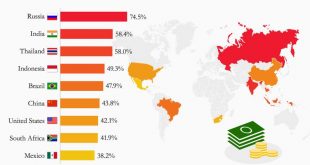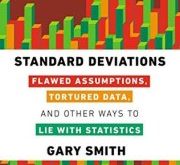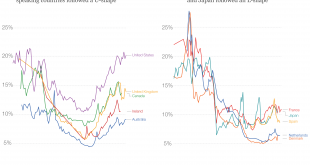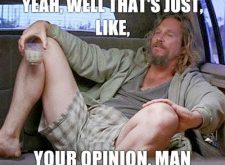from Dean Baker You have to love Robert Samuelson. He writes a column noting that baby boomers are leaving the workforce, and some are dying off, leaving the country to our children and grandchildren. He concludes the piece with a comment on the national debt. “To boot, there’s also a massive federal debt. Good luck.” Given the enormous damage that we have done to the environment, our children and grandchildren would be enormously forgiving if all they blamed us for is the national debt....
Read More »The world’s most unequal countries
Data without theory is always treacherous
from Lars Syll Data without theory can lead to bogus inferences … Before being comforted or alarmed, consider whether it makes sense to extrapolate. Is there a persuasive reason why the future can be predicted simply by looking at the past? Or is that wishful thinking? Or nothing at all? … Remember that even random flips can yield striking, even stunning, patterns that mean nothing at all … A statistical comparison of two things is similarly unpersuasive unless there is a logical reason...
Read More »American wealth redistribution 1989-2016
Trump’s trade war with China is waged to make the rich richer
from Dean Baker Donald Trump seems determined to double down and keep pressing forward on his trade war with China. He promises more and higher tariffs, apparently not realizing that U.S. consumers are the ones paying these taxes — not China’s government or corporations. While tariffs clearly impose a cost on people in the United States, this cost could be justified as a weapon to change a trading partner’s harmful practices. During his campaign, Trump pledged to wage a trade war with...
Read More »Chicago economics — garbage in, gospel out
from Lars Syll Every dollar of increased government spending must correspond to one less dollar of private spending. Jobs created by stimulus spending are offset by jobs lost from the decline in private spending. We can build roads instead of factories, but fiscal stimulus can’t help us to build more of both. This form of “crowding out” is just accounting, and doesn’t rest on any perceptions or behavioral assumptions. John Cochrane The problem with this view is, of course, that it is...
Read More »U-shape vs. L-shape income redistribution trends – 10 countries
Dean Baker Live Stream
Support the stream: https://streamlabs.com/deanbaker1
Read More »Women as workers
from Jayati Ghosh One of the enduring myths about capitalism that continues to be perpetuated in mainstream economic textbooks and other economic pedagogy is that labour supply is somehow exogenous to the economic system. The supply of labour is typically assumed (especially in standard growth theories) to be determined by the rate of population growth, which in turn is also seen as “outside” the economic system rather than in interaction with it. The reality is of course very different:...
Read More »Don’t think like a freak
from Lars Syll In their latest book, Think Like a Freak, co-authors Steven Levitt and Stephen Dubner tell a story about meeting David Cameron in London before he was Prime Minister. They told him that the U.K.’s National Health Service — free, unlimited, lifetime health care — was laudable but didn’t make practical sense. “We tried to make our point with a thought experiment,” they write … Rather than seeing the humor and realizing that health care is just like any other part of the...
Read More » Real-World Economics Review
Real-World Economics Review







